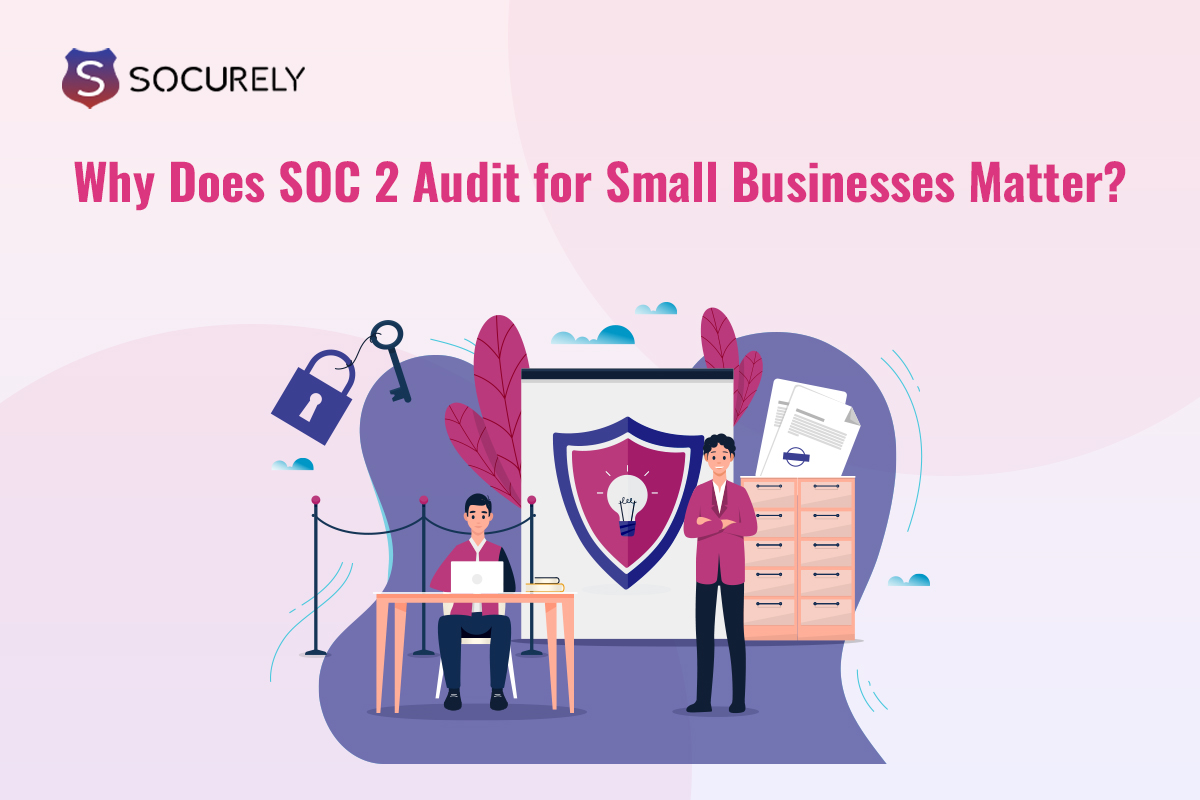Emerging small businesses who want to flourish their businesses by attracting enterprise clients should keep several key facts in mind. And one notable of them is keeping an eye on the security practices. And when it comes to validating the security infrastructure of a business, a SOC 2 audit is an eminent player. Integrating the best SOC 2 audits for small businesses provides a business with robust security against alarming security concerns. Find out about SOC 2 compliance audits in detail and know other crucial facts related to SOC 2 audits for small businesses.
Defining SOC 2 Compliance for Small-Scale Businesses
- SOC 2 audit is an independent method that evaluates internal controls for data protection.
- Trust service categories of SOC 2 include security, availability, confidentiality, processing integrity, and privacy.
- It is recommended for small businesses to validate cybersecurity.
- Similar to larger organizations but considers scope, resources, and third-party relationships.
- The audit process involves planning, implementation, and formal reporting.
Importance of SOC 2 Audit for Small Businesses
Assurance Amidst Uncertainty: Securing Customer Data
In the digital wilderness where threats lurk in every corner, a SOC 2 report emerges as a guardian, ensuring the sanctity of customer data amidst the chaos, shielding it from the grasp of nefarious actors, and providing a beacon of trust in uncertain times.
Regulatory Compliance and Credibility
In the intricate web of regulations and expectations, small businesses find themselves navigating treacherous waters. SOC 2 audits emerge as their guiding light, navigating the compliance requirements and enhancing their credibility in the eyes of regulators and customers alike, transforming regulatory burdens into opportunities for growth and resilience.
The Trust Factor: Fortifying Customer Loyalty
In the currency of trust, businesses must invest wisely to build strong foundations. Picture your business as a fortress, with customer trust as its cornerstone. A SOC 2 audit for small businesses acts as a fortress guard, fortifying those walls, preserving customer trust and loyalty, and ensuring that the bond between business and customer remains unbreakable amidst the storms of uncertainty.
Opening Doors to Enterprise Clients: The Golden Ticket of Assurance
In the realm of enterprise partnerships, SOC 2 certification is like a golden ticket, providing the reassurance enterprise clients seek for their data security concerns, forging pathways to lucrative partnerships, and opportunities for growth and collaboration.
Strengthening Internal Security: Building Resilience from Within
Every business has its vulnerabilities, its weak points susceptible to exploitation. Like a personal trainer for your business, a SOC 2 compliance audit embarks on a journey of introspection, identifying and addressing internal security weaknesses, and strengthening the foundation of resilience upon which your business thrives.
Accelerated Business Growth
In the competitive arena of business, resilience is the key to success. A SOC 2 certification sets your business apart as a support of reliability and security provides growth and success amidst the turbulence of uncertainty and competition.
How to Choose the Right SOC 2 Auditor for Your Small Business?
Choosing the right team of SOC 2 compliance auditors makes sure your business gets the optimum security against alarming threats. But to make the most out of this service, it’s crucial to find the right auditor. And to make this happen, following the right steps are necessary. Check those steps here.
Ask Some Questions
It’s important to know your SOC 2 auditor before you hire them. To get an idea of their working experience, and credibility, be sure to ask a few relevant questions like:
- What about your experience of working with other companies like mine?
- How many years of working experience do you have?
- Do you take the help of automated tools for performing audits?
Hire from the Reputed Resources
Reliable SOC compliance providers make sure to give the best services to the clients. For this reason, be sure to hire expert auditors from a company with good customer reviews. Check out their service details carefully and ensure they will be able to meet your specific business needs.
Find a Small Business Champion
Large audit firms cater to giants, not nimble startups. Look for an auditor with a proven track record of success with businesses similar to yours. They’ll understand your unique challenges and speak your language, avoiding a one-size-fits-all approach that might overwhelm your lean team.
Experience is King
Pick an auditor who isn’t just AICPA-affiliated (a mandatory requirement) but also boasts SOC 2 expertise. Ask about their experience with small businesses in your industry. Have they tackled similar security concerns? A seasoned auditor anticipates roadblocks and guides you smoothly through the process.
Communication is Key
The SOC 2 journey is a collaboration. Ensure your auditor prioritizes clear communication. They should explain complex concepts in a way your team understands, fostering trust and open dialogue. Look for an auditor who listens to your needs and tailors their approach accordingly.
A Stepwise Guide to Prepare a SOC 2 Audit Report
So you’ve decided to pursue a SOC 2 audit – a fantastic move for boosting your security posture and client trust. But let’s be honest, the process can feel daunting. Fear not, brave small business owner! Here’s a breakdown of the steps to navigate the SOC 2 audit landscape with confidence.
Step 1: Demystifying SOC 2 and Choosing Your Report Type
First things first, familiarize yourself with the SOC 2 framework before you start your journey to be SOC 2 compliant. It outlines five key trust categories: security, availability, processing integrity, confidentiality, and privacy. Based on your business needs, pick the relevant ones. Think of them as the areas you want the audit to assess.
There are two main report types: SOC 2 Type 1 and Type 2 with certain differences. A Type 1 report provides a snapshot of your designed controls at a specific point in time. It’s a good option if you need a quick assessment. A Type 2 report goes a step further, offering an opinion on the effectiveness of your controls over a while. Choose this if you want a more in-depth evaluation.
Step 2: Defining Your Audit Scope
The audit scope defines the boundaries of the assessment when you opt for SOC 2 audit for small businesses. It includes the systems, processes, and controls that will be scrutinized. Several factors influence your scope, like your overall business goals, relevant regulations, and reliance on third-party vendors.
Step 3: Building Your Security Playbook – Policies and Procedures
It’s the time to create or update your administrative policies and standard operating procedures (SOPs). These guidelines should be tailored to your business size, structure, and workflow. They’ll establish clear rules for people, processes, and technology within the audit scope. Think user access policies, risk assessments, security roles, and training schedules.
Step 4: Risk Assessment – Identifying Your Weaknesses
Small businesses often wear many hats, and security might not be everyone’s primary focus. This is where a risk assessment comes in. It helps you identify your vulnerabilities and prioritize them. Here’s a simplified approach:
- Identify critical components: Data, IT infrastructure, people, and procedures.
- Pinpoint risk factors: Data retention practices, third-party vendor risks, network weaknesses, etc.
- Rank the threats: Score them based on criticality (think 10 for the most critical).
- Assess current safeguards: What processes do you have in place to mitigate these risks?
Step 5: Plugging the Gaps – Implementing Security Controls
Based on your risk assessment, implement security controls. These can be administrative, technical, or physical, and might include:
- Network security measures like firewalls to protect your systems
- Surveillance systems for monitoring physical security
- Application security controls to safeguard your software
This might also involve system reconfigurations to align with industry best practices.
Step 6: Gathering the Evidence
Documentation is your golden ticket during a SOC 2 audit. It serves as proof that you’ve implemented the necessary controls. Here’s what you’ll likely need when opting for SOC 2 compliance for small businesses :
- Management Assertion: This outlines your operational objectives, internal controls, system requirements, and physical security measures.
- Technical Security Documents: Policies on log management, password requirements, data retention and destruction, and backup procedures.
- Operational Documents: Physical office diagrams, risk management plans, and vendor agreements.
- Human Resource Documents: Organizational charts, security awareness training logs, onboarding policies, and employee evaluations.
- Privacy and Compliance Documents: Your privacy policy and other compliance-related documents.
- Third-Party and Vendor Contracts: Agreements with vendors, along with any relevant controls they’ve implemented (remember, their SOC 2 reports can be helpful too).
Step 7: Readiness Assessment – Are We There Yet?
A readiness assessment is like a practice test for the actual audit. An external auditor can help you map your existing controls to the SOC 2 Trust Service Criteria and identify any areas needing improvement. This helps streamline the final audit by pinpointing potential issues beforehand.
Step 8: The Big Day – Undergoing the Formal Audit
Now comes the main event! Find a qualified auditor following the tricks mentioned before and walk through the SOC 2 audit for small businesses.
Conclusion
Building robust security strengthens your market position and boosts profits. While achieving SOC 2 compliance can feel daunting for startups, there are steps to streamline the process and achieve that golden SOC 2 certification report. So, go after them and help them integrate the best security practices into your business.
How Socurely Can Help?
Imagine launching risk assessments with a click, automated checks that tirelessly monitor your security, and evidence practically capturing itself. Sounds too good to be true, right? Well, Socurely can make this happen for you!
Keep your faith in Socurely to meet your SOC 2 compliance-related needs effortlessly. Our clever automation adapts to your specific needs, a super-smooth SOC 2 audit for small businesses, making the whole SOC 2 compliance venture super-easy.
FAQs on SOC 2 Audits for the Small Businesses
Should my small business even bother with SOC 2 Audits?
Absolutely! Here’s the deal: Enterprise-level clients take security seriously. If you want to play in that league, showing you’ve got robust security practices is a must. SOC 2 acts like a security badge, giving them confidence in your ability to protect their data. Plus, a strong security posture makes your business more attractive to investors and partners – that translates to growth and success!
Type 1 or Type 2? Picking the right SOC 2 report.
Think of SOC 2 reports as snapshots of your security controls. A Type 1 report is like a quick photo – it shows what controls you have in place at a specific point in time. It’s a good option if you’re new to the audit world and want to get a baseline understanding of your security posture. However, a Type 2 report goes a step further. It’s like a video – it shows how effectively your controls are working over some time.
How much time and effort will this take?
Let’s be honest, SOC 2 audits for small businesses aren’t like a walk in the park. But with careful planning and the right tools, you can streamline the process. The payoff can be huge – increased trust, better scalability, and the ability to land those dream contracts.







